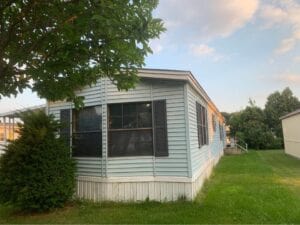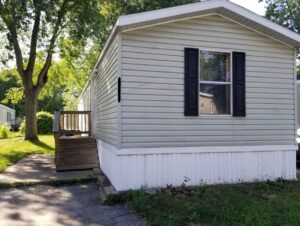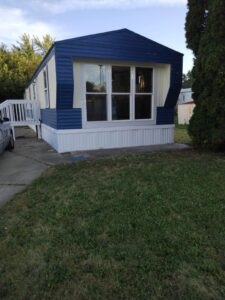Ever wondered why mobile homes are so cheap? Well, here’s the lowdown. Mobile homes provide an affordable housing option for countless individuals and families across the globe. Compared to traditional houses, their price tags are significantly lower, making them an attractive choice for budget-conscious buyers. The secret lies in their cost-effective construction methods and materials.
Why Are Mobile Homes So Cheap? Pros & Cons
Moreover, financing options tailored specifically for mobile homes make it even easier to own one. With flexible payment plans and accessible loans available, you can fulfill your dream of becoming a proud mobile homeowner without breaking the bank. Affordable doesn’t mean sacrificing quality either. Many modern mobile homes offer impressive amenities and stylish designs.

So, if you’re looking for a pocket-friendly housing solution that doesn’t compromise on comfort or style. Consider exploring the world of mobile homes. Discover how these affordable abodes can provide you with a cozy sanctuary while keeping your finances intact.
Advantages and Disadvantages of Buying Manufactured Housing
Flexibility in Terms of Location and Mobility
One of the key advantages of buying a manufactured home is the flexibility it offers in terms of location and mobility. Unlike traditional houses, mobile homes can be easily transported to different locations. This allows homeowners to change their surroundings without going through the hassle of selling or renting out a property. This feature is particularly appealing for individuals who enjoy traveling. It is also great for those who have jobs that require frequent relocation.
Furthermore, manufactured homes are often situated in communities specifically designed for these types of houses. These communities provide various amenities such as recreational facilities, parks, and social events, fostering a sense of community among residents. This aspect can be highly desirable for individuals seeking a tight-knit neighborhood atmosphere.
Lower Maintenance Costs: Why Are Mobile Homes So Cheap?
Another advantage that makes mobile homes attractive to buyers is their generally lower maintenance costs compared to regular houses. The construction materials used in manufactured housing are often more affordable than those used in traditional homes. Mobile homes are typically smaller in size, which means less surface area to maintain and fewer rooms to clean.

Moreover, since mobile homes are built in controlled environments like factories, they undergo rigorous quality control measures during the manufacturing process. As a result, these homes are often constructed with durable materials that require minimal upkeep over time. This not only saves homeowners money on repairs but also reduces the need for constant maintenance.
Limited Customization Options
While there are several advantages associated with purchasing a manufactured home, it is important to consider some potential disadvantages as well. One significant drawback is the limited customization options available when buying a mobile home. Unlike traditional houses where homeowners have greater freedom to personalize their living spaces according to their preferences, manufactured houses often come with pre-determined floor plans and design choices.
However, it’s worth noting that some manufacturers do offer customization options within certain limits. Buyers may have choices regarding interior finishes such as flooring, cabinetry, and paint colors. Nevertheless, the overall design and structural layout of the home may have limitations due to its factory-built nature.
Factors affecting the low cost of mobile homes
Mobile homes have long been known for their affordability compared to traditional houses. There are several key factors that contribute to the low cost of these homes, making them an attractive option for many buyers.
Efficient manufacturing processes
One of the primary reasons why mobile homes are so cheap is due to the efficient manufacturing processes involved in their construction. Unlike traditional houses that are built on-site, mobile homes are manufactured in a factory setting. This controlled environment allows for streamlined production and reduces costs significantly.
In these factories, skilled workers can specialize in specific tasks, allowing them to work quickly and efficiently. Assembly lines and automation technologies further enhance productivity while keeping labor costs down. The use of standardized designs and building techniques also helps save time and money during the construction process.
Bulk purchasing of materials
Another factor that contributes to the affordability of mobile homes is bulk purchasing of materials. Mobile home manufacturers often buy materials in large quantities, taking advantage of economies of scale. By purchasing materials in bulk, they can negotiate better prices with suppliers and pass those savings on to consumers.
Bulk purchasing not only applies to basic construction materials like lumber and insulation but also extends to fixtures, appliances, and other components used in mobile home production. This enables manufacturers to offer affordable options without compromising on quality.
Lower land expenses
Compared to traditional houses, mobile homes require less land for placement. This reduced land requirement directly translates into lower expenses for homeowners. While traditional houses often come with significant land costs, including property taxes and maintenance fees, mobile home owners typically pay less or even rent the land where their home is situated.
Because mobile homes are typically located within communities specifically designed for manufactured housing, infrastructure costs such as roads and utilities are shared among residents. This communal approach further lowers individual expenses associated with land ownership.

Simplistic Design and Minimalism: Why Are Mobile Homes So Cheap
Mobile homes have gained popularity over the years due to their affordability, and one of the key factors contributing to their low cost is their simplistic design and emphasis on minimalism. By prioritizing simplicity, mobile home manufacturers are able to reduce construction complexity and ultimately lower costs for buyers.
There is often a focus on intricate architectural designs and elaborate floor plans that can significantly drive up the overall cost. In contrast, mobile home designs take a more practical approach, favoring simple yet functional layouts that maximize space utilization in compact living areas.
The interiors of mobile homes are designed with minimalism in mind. This means that every inch of space is carefully considered to ensure efficient use. By eliminating unnecessary clutter and focusing on essential elements, such as multi-purpose furniture and clever storage solutions, mobile homeowners can make the most out of limited square footage without sacrificing comfort or functionality.
Streamlined layouts play a crucial role in keeping costs down. These streamlined designs minimize material usage while still providing all the necessary amenities for everyday living. With fewer materials required for construction, manufacturers are able to reduce expenses associated with building supplies.
Mobile Homes Are Built in Factories: Why Are They So Cheap
Moreover, since mobile homes are built in factories rather than on traditional sites like HUD (Department of Housing and Urban Development) regulated parks or private land where traditional houses are constructed, they can be assembled using modular techniques. This allows for greater efficiency during the building process as each module is precisely manufactured off-site before being transported to its final destination. As a result, labor costs associated with on-site construction are significantly reduced.
In addition to their simplistic design approach, another factor contributing to the affordability of mobile homes is their foundation requirements. Unlike traditional houses that typically require a concrete foundation or basement, many mobile homes sit on blocks or piers. This reduces both time and expense during installation as well as ongoing maintenance costs.
Putting It All Together: Why Are Mobile Homes So Cheap
Overall, the combination of simple designs, minimalist interiors, streamlined layouts, modular construction techniques, and cost-effective foundation options all contribute to why mobile homes are so cheap. By prioritizing functionality over unnecessary frills and focusing on practicality, mobile home manufacturers are able to provide affordable housing solutions for individuals and families looking for a place to call their own.
So if you’re in the market for an affordable housing option that doesn’t compromise on comfort or quality, mobile homes offer a compelling choice. With their simplistic design and minimalistic approach, they provide an opportunity for homeownership at a fraction of the cost of traditional houses.
Affordable Materials Used in Construction
Mobile homes are often praised for their affordability, and one of the key reasons behind this is the use of cost-effective materials in their construction. Manufacturers opt for cheap materials that still provide durability and functionality, allowing them to offer mobile homes at lower price points compared to traditional houses.
One commonly used material in mobile home construction is vinyl siding. Vinyl is a synthetic material that is lightweight, easy to install, and relatively inexpensive. It offers decent insulation properties, protecting the interior from harsh weather conditions while keeping energy costs down. Vinyl siding requires minimal maintenance, reducing long-term expenses for homeowners.

Another affordable material frequently found in mobile homes is metal roofing. Metal roofs are durable, fire-resistant, and have a long lifespan. They require less maintenance compared to other roofing options and can withstand extreme weather conditions effectively. By using metal roofs instead of more expensive alternatives like clay tiles or asphalt shingles, manufacturers can keep the overall cost of mobile homes low.
Cheap Materials In Mobile Homes
In addition to selecting cheap materials for the exterior, mobile home builders also focus on utilizing standardized components throughout the construction process. This approach streamlines production and reduces costs by enabling mass production techniques. Standardization allows manufacturers to order materials in bulk at discounted rates due to economies of scale.
The lightweight nature of these affordable materials plays another crucial role in keeping mobile home costs down. Since they weigh significantly less than traditional building materials like bricks or concrete blocks, transportation expenses during manufacturing and installation processes are minimized. This not only reduces fuel consumption but also lowers labor costs associated with handling heavy materials.
Why Are Mobile Homes So Cheap?
Furthermore, manufacturers often prioritize cost-effectiveness without compromising quality entirely. While luxurious options like granite countertops may be reserved for higher-end models or customizations upon request, there are plenty of budget-friendly alternatives available that still provide an appealing aesthetic.
By constructing mobile homes in a factory-controlled environment rather than on-site, manufacturers can further reduce expenses. Factory production allows for efficient use of labor and materials, minimizing waste and maximizing productivity. Site preparation costs are significantly lower compared to traditional homes since mobile homes do not require a concrete foundation.
Easy Mobility and Transportation Benefits: Why Are Mobile Homes So Cheap?
Mobile homes are known for their unique advantage of easy mobility and transportation. This feature allows manufacturers to take advantage of cheaper labor or resources available in different locations. By being able to transport mobile homes, manufacturers can choose areas where production costs are lower, resulting in more affordable prices for buyers.
The ability to transport mobile homes efficiently also reduces overall production costs. Instead of building the homes on-site, manufacturers can construct them in a centralized location with access to cheaper materials and labor. Once the construction is complete, the mobile homes can be transported to various destinations without incurring significant expenses.
Advantages of Mobile Home Cheap Relocation
One of the main advantages of mobile home relocation is the flexibility it offers without imposing significant financial burdens. Unlike traditional houses, which require extensive planning and expenses for relocation, mobile homes provide an easier way to move from one place to another. This flexibility allows people to adapt their living arrangements according to changing circumstances or preferences.
Mobile homes provide an attractive option for those who value freedom and want the ability to move whenever they desire. Many people choose this lifestyle as it allows them to explore different regions or climates without committing themselves permanently. Whether it’s moving closer to family members or relocating due to employment opportunities, mobile homes offer a convenient solution that traditional houses cannot match.
While there are several advantages associated with mobile home mobility and transportation, it is essential to consider some potential drawbacks as well. For instance, transporting a mobile home may lead to damage if not done carefully. The structure needs proper support during transit, ensuring that it remains intact throughout the journey.
Moreover, regulations regarding zoning restrictions and permits can pose challenges when moving a mobile home from one area to another. Different states or localities may have specific rules governing the transportation and placement of these structures. It’s crucial for individuals considering relocating their mobile homes to familiarize themselves with these regulations beforehand.
Comparing the Long-term Value of Mobile Homes to Regular Homes
Mobile homes have long been regarded as an affordable housing option, butThere are several factors that need to be considered. Let’s delve into these aspects and explore why mobile homes tend to be cheaper in the market.
Mobile home appreciation rates tend to be slower than those of traditional houses due to market factors.
One key aspect is the appreciation rate. However, mobile homes generally have slower appreciation rates compared to regular houses. This can be attributed to various market factors such as limited demand and higher supply of mobile homes. The perception surrounding mobile home communities may affect their desirability in certain areas.
Ongoing maintenance costs may be higher for older mobile homes compared to newer ones, impacting long-term value considerations.
While the initial purchase price of a mobile home might be lower than that of a traditional house, it’s important to consider ongoing maintenance costs. Older mobile homes often require more frequent repairs and updates, which can add up over time. From roof repairs and plumbing issues to electrical system upgrades, homeowners may face additional expenses that impact the overall long-term value of their investment.
The resale value of a well-maintained mobile home can still provide a return on investment over time.
Despite slower appreciation rates and potential maintenance costs, a well-maintained mobile home can still offer a return on investment over time. By keeping up with regular maintenance and making necessary improvements or upgrades when needed, homeowners can preserve or even increase the resale value of their property. This is particularly true for newer models that come with modern amenities and energy-efficient features.
Some individuals choose to live in mobile home parks or communities where they pay rent for the land rather than owning it outright. While this arrangement might not provide equity like traditional homeownership does, it can still be an affordable option for those seeking a place to live without the burden of property ownership.
Understanding the Affordability and Value of Mobile Homes: Why Are Mobile Homes So Cheap
In conclusion, mobile homes are so cheap due to a combination of factors that make them a highly affordable housing option. The simplistic design and minimalism in mobile homes contribute to their cost-effectiveness, as they eliminate unnecessary expenses associated with larger, more elaborate houses. The use of affordable materials in construction helps keep the overall cost down.
Furthermore, the easy mobility and transportation benefits of mobile homes play a significant role in their affordability. Unlike traditional houses, mobile homes can be easily moved from one location to another without major expenses or complications. This flexibility allows homeowners to explore different areas without having to invest in new properties.
When comparing the long-term value of mobile homes to regular homes, it’s important to consider both financial and lifestyle aspects. While traditional houses may appreciate in value over time, they often come with higher upfront costs and ongoing maintenance expenses. On the other hand, mobile homes offer an immediate solution at a fraction of the price.
To fully understand why mobile homes are so cheap, it is crucial to weigh the advantages and disadvantages before making a decision. Consider factors such as lower property taxes and utility costs associated with manufactured housing compared to traditional houses.
Why Are Mobile Homes So Cheap: Conclusion
In conclusion, if you’re looking for an affordable housing option that offers simplicity, mobility, and long-term value potential, exploring the world of mobile homes could be an excellent choice for you. Take advantage of their low cost while enjoying all the comforts of home.
FAQs: Why Are Mobile Homes So Cheap?
Q: Are there any drawbacks to buying a mobile home?
A: While there are advantages to purchasing a mobile home such as affordability and flexibility, it’s essential to consider potential drawbacks such as limited appreciation in value compared to traditional houses and potential zoning restrictions in certain areas.
Q: Can I customize my mobile home?
A: Yes! Many manufacturers offer customization options for interior finishes and layouts when purchasing a new mobile home. However, keep in mind that structural modifications may be limited due to the nature of mobile homes.
Q: What kind of maintenance is required for a mobile home?
A: Mobile homes require regular maintenance similar to traditional houses. This includes routine inspections, repairs, and upkeep of essential systems such as plumbing, electrical, and HVAC. Regular cleaning and exterior maintenance are also necessary.
Q: Can I finance a mobile home purchase?
A: Yes, financing options are available for mobile homes. You can explore loans specifically designed for manufactured housing or work with lenders who specialize in this type of financing.
Q: Are mobile homes built to last?
A: Mobile homes are built with durability in mind. However, their lifespan can vary depending on factors such as quality of construction, maintenance practices, and environmental conditions. Proper care and regular inspections can help prolong the life of your mobile home.
You might also be interested in our articles:
